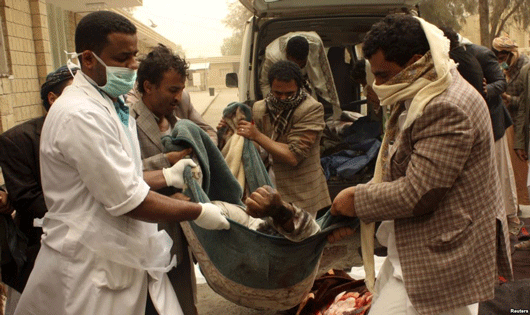
Local Editor
Action On Armed Violence’s data from March 2015 to January 2016 shows that air attacks in Yemen - which are almost exclusively launched by Saudi-led coalition forces - have killed and injured at least 4,150 civilians.
More than half of the incidents AOAV recorded took place in areas coded as populated (containing a significant density of civilians). In these incidents, 92% of resulting deaths and injuries were civilians.
A recently released report from the Control Arms Coalition has highlighted the continuing large-scale international arms sales providing Saudi Arabia with military equipment, new weaponry and ammunition. Sales have not stopped despite many allegations of the Saudi-led coalition’s indiscriminate use of explosive weapons in Yemen leading to huge civilian casualties.
More specifically, the coalition has been accused of deliberately bombing hospitals.
AOAV has recorded at least four incidents where coalition bombings have hit healthcare infrastructure. There have also been at least two high-profile airstrikes on wedding parties. All of this points to flagrant violations of IHL.
Most of the states selling weapons to Saudi Arabia are signatories or parties to the Arms Trade Treaty (ATT). This treaty intends to reduce human suffering by regulating the provision of arms, which could be used in violations of International Humanitarian Law.
The total reported value - even with only limited data - of licenses and sales to Saudi Arabia by ATT signatories in 2015 was more than $25 billion.
Parties to the ATT like the UK are bound directly to keep to its provisions. Legally, parties are required to carry out comprehensive risk assessments to determine the likelihood of weapons being used in breaches of IHL. They are also obliged to prevent any transfer of items if they have knowledge that these items would be used in the commission of war crimes, genocide or violations of the Geneva Conventions - including ‘attacks directed against civilian objects or civilians protected as such.’
In spite of huge amounts of evidence pointing to the indiscriminate use of explosive weapons by the coalition and suggestions that they have deliberately targeted both civilians and humanitarian infrastructure like hospitals, the UK continues to make arms deals with Saudi Arabia.
Between 1 January and 30 September 2015 the UK government issued 152 licenses with a total value of £2.8 billion ($4.6 billion - nearly a fifth of total licenses and sales). It also continued previously arranged deliveries - which it is legally obliged to reconsider - including three Typhoon jets and 2,400 Paveway bombs.
Signatories - a category which includes the US, the largest provider of arms to Saudi Arabia - are obliged not to act in a way which runs counter to the aims of the treaty. This means that - given that the reduction of human suffering is a specific aim of the treaty - signatories are required to avoid providing arms to countries likely to use them in IHL violations.
In spite of this, in 2015 the US exported 35 Apache helicopters to Saudi Arabia and approved six major arms sales, including orders for 19 helicopters and 600 Patriot missiles.
Not all arms deals with Saudi Arabia necessarily contravene the ATT. But the Saudi-led coalition’s indiscriminate airstrikes on civilian areas and possible direct targeting of civilian infrastructure are clear violations of IHL and thus grounds for stopping at the very least the sale of ever more destructive air power.
AOAV has called upon all signatories and parties to the Arms Trade Treaty to comply with their legal obligations and stop the export of lethal military equipment, which clearly risks being used in violation of IHL. The sale of weapons to Saudi Arabia and other states has direct humanitarian consequences - and preventing their sale could have direct humanitarian benefit in curtailing further slaughter.
Sources: News Agencies, Edited by Website Team